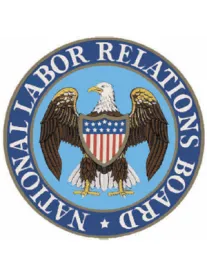Peter Ohr, the new top lawyer at the National Labor Relations Board (NLRB), issued a memorandum on March 31, 2021, regarding employees’ right to act together to improve their working conditions, which has long been guaranteed under Section 7 of the National Labor Relations Act (NLRA). Acting General Counsel Ohr dusted off Section 7 with an eye toward highly charged issues like employee health and safety during the COVID-19 pandemic, national efforts to increase the minimum wage, and political and social justice movements. Employers should remain cognizant that employee activity in these realms may be protected, and should tread carefully when these issues arise in their workplace.
Section 7 of the NLRA guarantees employees the right to “self-organization, to form, join, or assist labor organizations, to bargain collectively through representatives of their own choosing, and to engage in concerted activities, for the purpose of collective bargaining or other mutual aid or protection.”
What does this actually mean? As Ohr cites, employees’ conduct may be protected if there is a link between the activity at issue and their workplace interests or concerns—including efforts to improve working conditions outside the direct employer-employee channels. Section 8 of the NLRA prohibits employers from discriminating against employees for exercising their Section 7 rights. And take note: These protections are not limited to unionized workforces. So long as an employer is covered by the NLRA (and most private-sector employers are), its employees are entitled to engage in Section 7 activity without reprisal.
Indeed, while employees’ right to band together has traditionally arisen with union campaigns or protests about wages or hours, Ohr points further to workplace safety and health concerns and, in some circumstances, employees’ political and social justice advocacy. For example, he cites as protected, concerted activity:
-
“A hotel employee’s interview with a journalist about how earning the minimum wage affected her and employees like her, and how legislation to increase the minimum wage would affect them”;
-
“A ‘solo’ strike by a pizza-shop employee to attend a convention and demonstration where she and others advocated for a $15-per-hour minimum”; and
- “[P]rotests in response to a sudden crackdown on undocumented immigrants and the possible revival of workplace immigration raids.”
Ohr indicates that, going forward, employee activities regarding “a variety of societal issues” will be viewed through a lens of potential Section 7 protection. While he acknowledges that the current NLRB’s recent decisions reflect a more restricted interpretation of protected activity, Ohr nonetheless emphasizes that there remain open avenues to establish Section 7 rights and directs the Board’s regional offices to use them.
The memo also reminds the Board that some activity may be “inherently” concerted. This can be true even if a discussion begins “one way,” with a speaker and a listener. Ohr outlines that the Board has found discussions involving wages, schedules, and job security as “inherently concerted.” And, noting that discussions about workplace health and safety and race discrimination could be as well, Ohr vows to consider applications of the so-called inherently concerted doctrine where suitable.
Bottom line: The scope of employees’ Section 7 rights can change with the times, and with administrations. Employers should stay attuned to these changes or risk falling out of step with the rights guaranteed to their workforce, and into Ohr’s now-promised robust NLRA enforcement efforts.




 />i
/>i
